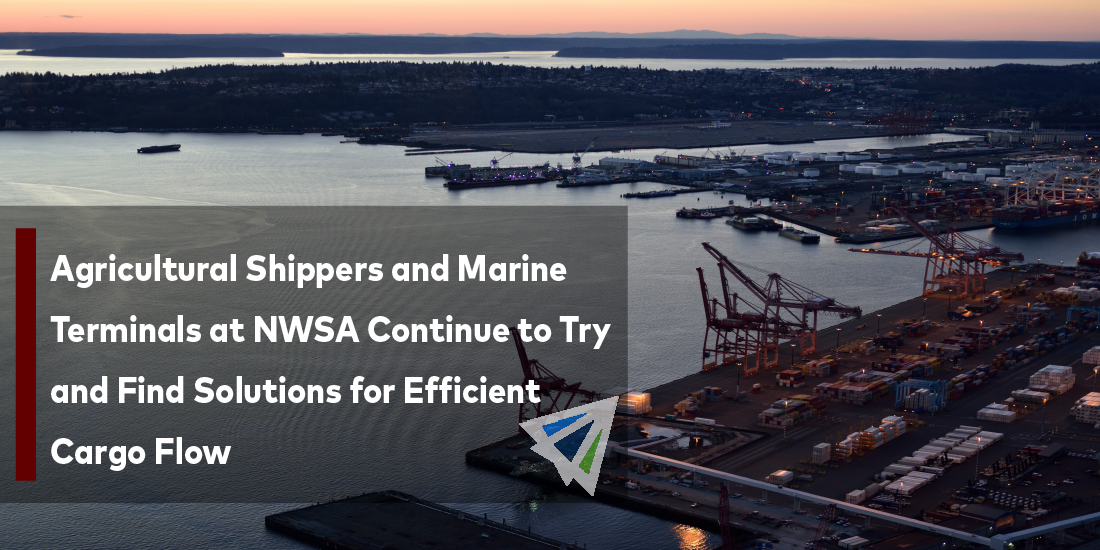For agricultural exporters who are dealing with declining backhaul vessel capacity and declining import volumes, the marine terminals at the Northwest Seaport Alliance (NWSA) in Seattle and Tacoma are looking to potentially change their receiving hours and gate closures in order to better handle cargo that’s being routed towards Asia.
Drop In Imports Affects U.S. Ag Exports
Imports have been low for some time, and it’s beginning to affect port workers’ schedules. Recently, operational staff at the US West Coast terminals were forced to cancel one or more of their shifts due to the decrease in import activity. This has an unfortunate ripple effect on those exporting from the U.S., as the staffing is below what’s necessary to handle the volume of outbound cargo, which is causing increased costs and delays for U.S. based shippers.
According to Peter Friedmann, executive director of the Agriculture Transportation Coalition (AgTC), “I have to hand it to the terminal operators, they’re trying to come up with solutions.”
Agricultural shippers are currently working with marine ports at the NWSA to guarantee exporters have enough receiving hours for their goods. In an “all hands on deck” solution, the NWSA put together a task force of truckers, terminal operators, and agricultural exporters in March to help brainstorm and solve issues related to flex hours at the terminals, gate closures, and who is accountable for paying for extra services. Tom Bellerud, the COO of the NWSA, remains optimistic. While it may take some time to get there, he’s expecting that the industry will experiencing relief in the near future.
According to PIERS, containerized agricultural exports from the US to Asia fell to 113,883 TEU in January, which was a 5.2 percent decrease from the same month last year.
In the Pacific Northwest, the difficulty for terminal operators is that each terminal has unique requirements depending on the carriers it handles and the shippers who have contracts with those lines. According to Ed DeNike, president of SSA Containers, SSA Marine, which runs Terminals 5, 18, and 30 in Seattle, has been closing those facilities on Fridays as a result of the sudden drop in cargo shipments and activity at the ports.
Initial Solutions & Conversations
Farmers have requested that at least one of those terminals remain open on Fridays and close on Mondays instead, but SSA has encountered resistance from its carrier clients, according to DeNike. He said that SSA is bending its gate hours on some days, opening at 7:00am instead of 8:00am, which appears to be providing assistance to agricultural shippers.
In order to better serve agricultural shippers and their truckers, the Pierce County, Husky, and Washington United ports in Tacoma are attempting to coordinate their gate closures and reopening, according to Bellerud. The terminals are considering working together in order to ensure that a minimum of one of them keep operations going on Fridays. Whether or not that will come to fruition is yet to be known, but the conversations are being had.
Additionally, he added, Washington United Terminal is collaborating with hay exporters to increase export reception windows.
According to terminal operators, continuous negotiations with shippers include creating a cost structure that satisfies the demands of both parties because services that are customized to shippers’ comes with an added expense. While they want to cover some of that, at a certain point, it becomes unsustainable. Depending on what the operation looks like, a single work shift could cost terminal operaters in the ballpark of $75,000-$100,000.
According to Friedmann, the price structure is still up for debate between the various terminal operators and the exporters who want longer gate hours. They currently have not arrived at a solution, but as is with the rest of this situation, the conversations are being had and everyone is working towards a solution that will restore efficiency and balance to both U.S. exporters as well as terminal operators.
